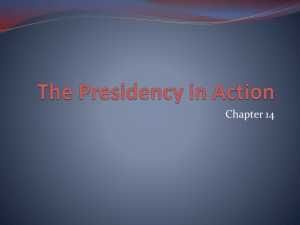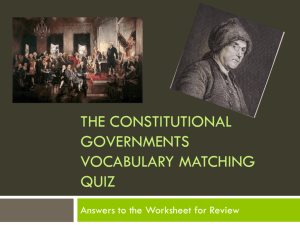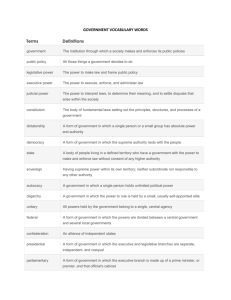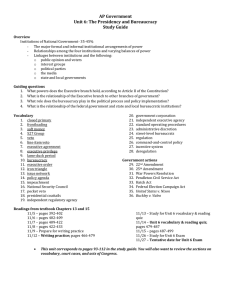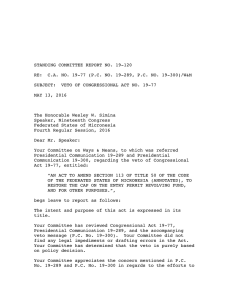Institutions of Government Vocabulary
advertisement
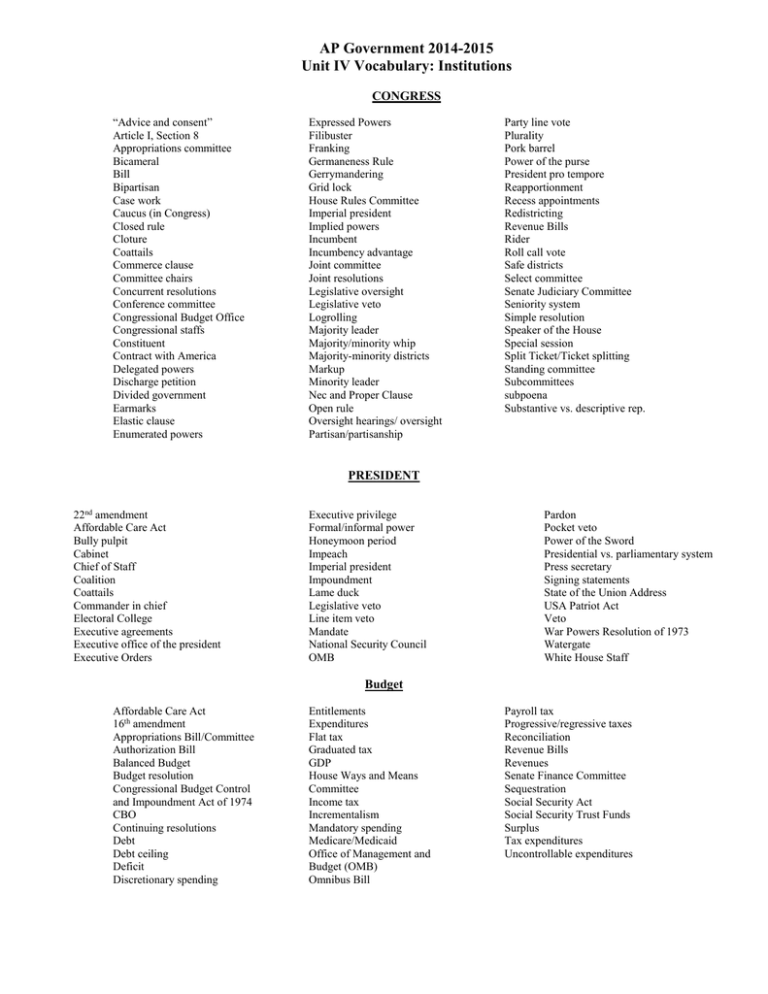
AP Government 2014-2015 Unit IV Vocabulary: Institutions CONGRESS “Advice and consent” Article I, Section 8 Appropriations committee Bicameral Bill Bipartisan Case work Caucus (in Congress) Closed rule Cloture Coattails Commerce clause Committee chairs Concurrent resolutions Conference committee Congressional Budget Office Congressional staffs Constituent Contract with America Delegated powers Discharge petition Divided government Earmarks Elastic clause Enumerated powers Expressed Powers Filibuster Franking Germaneness Rule Gerrymandering Grid lock House Rules Committee Imperial president Implied powers Incumbent Incumbency advantage Joint committee Joint resolutions Legislative oversight Legislative veto Logrolling Majority leader Majority/minority whip Majority-minority districts Markup Minority leader Nec and Proper Clause Open rule Oversight hearings/ oversight Partisan/partisanship Party line vote Plurality Pork barrel Power of the purse President pro tempore Reapportionment Recess appointments Redistricting Revenue Bills Rider Roll call vote Safe districts Select committee Senate Judiciary Committee Seniority system Simple resolution Speaker of the House Special session Split Ticket/Ticket splitting Standing committee Subcommittees subpoena Substantive vs. descriptive rep. PRESIDENT 22nd amendment Affordable Care Act Bully pulpit Cabinet Chief of Staff Coalition Coattails Commander in chief Electoral College Executive agreements Executive office of the president Executive Orders Executive privilege Formal/informal power Honeymoon period Impeach Imperial president Impoundment Lame duck Legislative veto Line item veto Mandate National Security Council OMB Pardon Pocket veto Power of the Sword Presidential vs. parliamentary system Press secretary Signing statements State of the Union Address USA Patriot Act Veto War Powers Resolution of 1973 Watergate White House Staff Budget Affordable Care Act 16th amendment Appropriations Bill/Committee Authorization Bill Balanced Budget Budget resolution Congressional Budget Control and Impoundment Act of 1974 CBO Continuing resolutions Debt Debt ceiling Deficit Discretionary spending Entitlements Expenditures Flat tax Graduated tax GDP House Ways and Means Committee Income tax Incrementalism Mandatory spending Medicare/Medicaid Office of Management and Budget (OMB) Omnibus Bill Payroll tax Progressive/regressive taxes Reconciliation Revenue Bills Revenues Senate Finance Committee Sequestration Social Security Act Social Security Trust Funds Surplus Tax expenditures Uncontrollable expenditures BUREAUCRACY Administrative discretion bureaucracy Cabinet Civil service Civil service exam Command and control policy Deregulation Dodd Frank Wall St Ref. and Consumer Protection Act Executive orders EPA FDA FOIA Incentive system Independent executive agency Independent regulatory agencies Iron triangles Legislative veto Merit principle Patronage Pendleton Act Policy implementation Red tape Regulation subpoena transparency COURTS “switch in time” Amicus curiae briefs Appellate jurisdiction Brief Burger Court Chief justice Civil law Class action Common law Concurring opinion Courts of appeal Court of claims Defendant Dissenting opinion District courts Diversity cases En banc Exclusive jurisdiction Federal question cases Federalist 78 Injunction Judicial activism Judicial restraint Judicial review Jurisdiction Justiciable disputes Jury Litmus test Loose construction majority opinion Marbury v Madison minority opinion original intent original jurisdiction per curiam decision plaintiff plea bargaining political questions precedent Rehnquist Court Roberts Court Rule of 4 Senatorial courtesy Solicitor general Standing to sue Stare decisis Statutory construction Strict construction Subpoena Supreme Court unanimous decision Warren court Writ of certiorari Writ of mandamus




